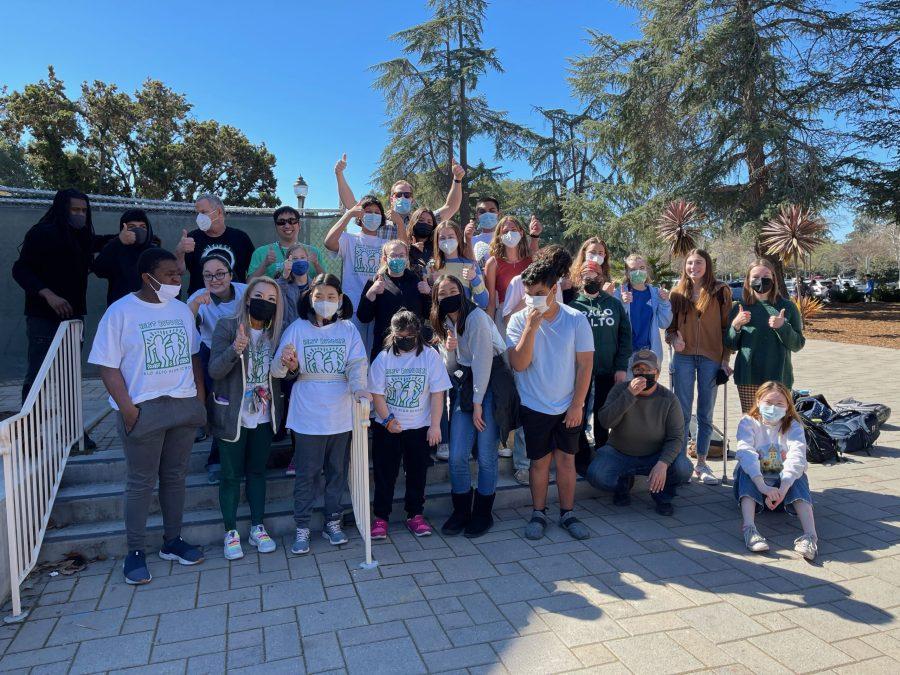Sophomore Juan Pinto-Saldana sits down with his classmates for lunch, unwraps his sandwich, and waits for the rest of the Best Buddies club members to arrive. After the bell, students pour in from their 6th period class, sit down, and strike up a conversation about their day or what they have to eat.
This lunch get-together is the bi-weekly meeting for Best Buddies, a club that pairs neurotypical students with students with intellectual and developmental disabilities (IDD). Buddies meet to eat and talk and do activities at these lunchtime meetings and are encouraged to make plans together after school hours. The Best Buddies club is only one part of the larger Best Buddies organization, an international nonprofit that has branches around the globe.
California Best Buddies’ Program Supervisor Melissa Cagney said the Best Buddies mission is to promote inclusivity and societal normalization of people with IDD and create a space where people with IDD can build strong relationships with other people.
“You’ll find that oftentimes in schools, (students with IDD) are separated because they require different education or different resources,” Cagney said. “So Best Buddies really unites the special education and general education population at schools to have social inclusion.”
Special Education teacher Grace Park said the meaningful relationships the club creates foster growth and joy for her students.
“Spending time and listening to people means the world to them,” Park said. “It’s an amazing feeling when someone wants to hear you out or to spend time with you, so it’s priceless for both my students, who are (special education) students, and the other students here at Paly to learn from each other and build on with each other’s time together.”
Pinto-Saldana, a member of Best Buddies, said he loves being part of the club.
“I really enjoy Best Buddies,” Pinto-Saldana said. “I like talking to all my new friends and eating lunch with them.”
Senior Rani Rambo also said that she enjoys the club because of the time she spends with her buddy.
“I like to hang out with Sophia, my buddy and my (other) friends too,” Rambo said.
Cagney also said other than the one-to-one friendships created through school clubs, Best Buddies has other programs for people with IDD, some of which extend into adult life and help people with IDD navigate finding a job and building community without the support that they may have had when they were younger.
“Our four programs — one-to-one friendships, integrated employment, leadership development and inclusive living — create opportunities for people with IDD,” Cagney said.
Through each of these programs, Best Buddies equips people with knowledge on how to accommodate, understand and communicate with people with IDD through spreading disability awareness, Cagney said
“In our one-to-one friendship program, we get people as young as elementary schoolers that have never heard of many disabilities,” Cagney said. “So we’re teaching societal norms from the very beginning on how to be inclusive to individuals with disabilities early on, so that when they get older, they’re not startled and don’t know the language to use or how to behave around individuals with IDD.”
Cagey said even today, too many stigmas exist surrounding IDD and people with IDD, so promoting awareness and education about the subject are important for debunking the misconceptions that students may have.
“I think the word disability — a lot of people see it as a bad word, but that encompasses so much,” Cagney said. “So specifically at Best Buddies, we focus on intellectual and developmental disabilities. That can range from autism to cerebral palsy to Down syndrome. Not all disabilities are physical or visible, and people are capable of much more than they’ve been giving credit for.”
Parks said that bringing awareness to IDD fosters community and a deeper connection to others with a disability and creates a much-needed societal normalization of having IDD.
“It’s OK that they do things differently,” Park said. “It’s important for others to understand that their differences are not bad differences, but differences that we can also do our best to help if we know more about.”

